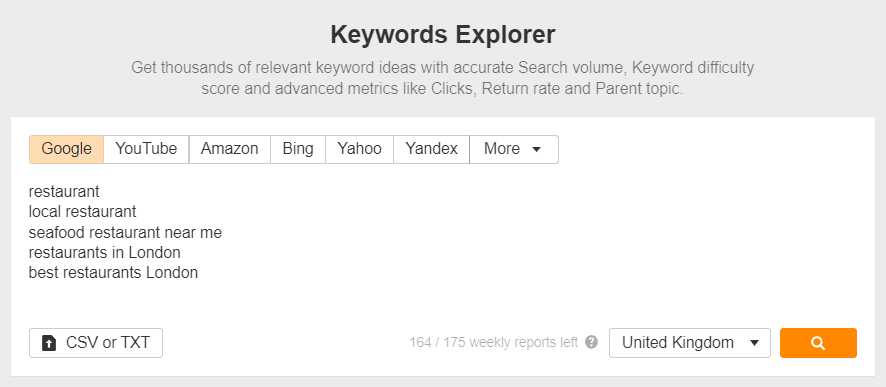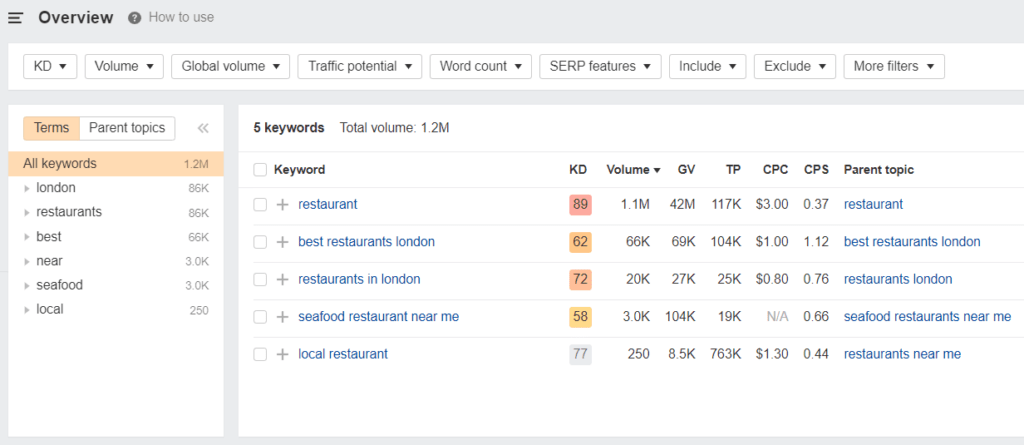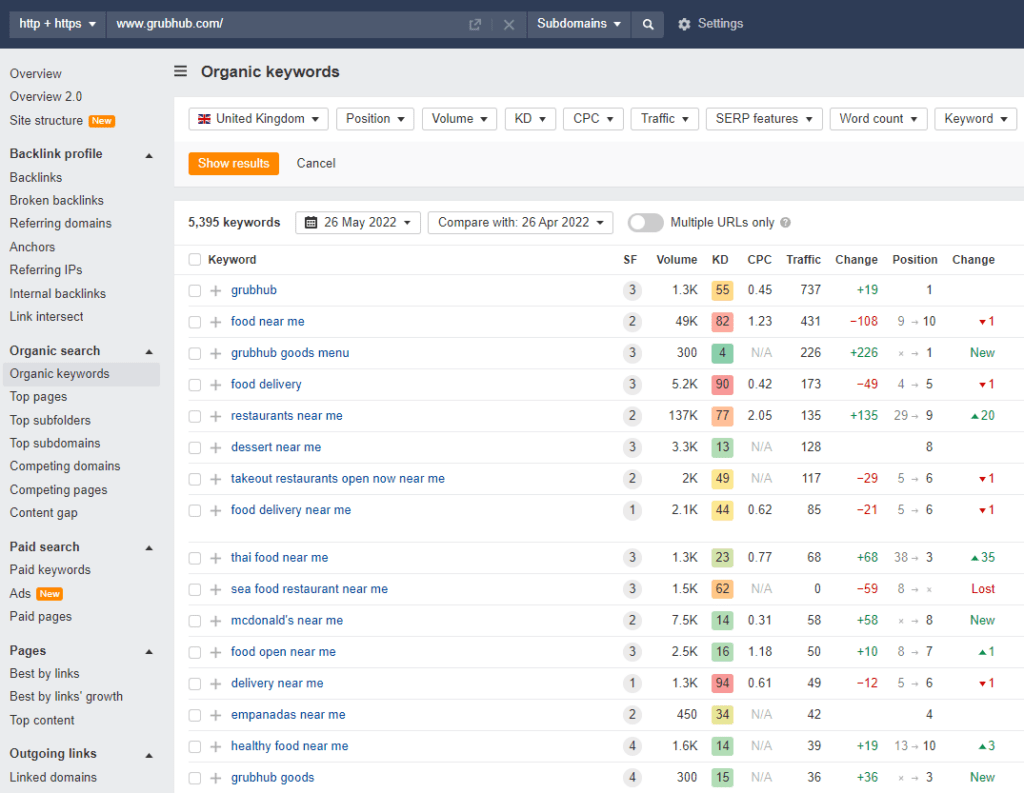Key Points
- Keywords are search terms that internet users enter into search bars to seek information or make inquiries. When added to online content, keywords make it easier for prospects to discover a website through search engines.
- Keyword research is the foundation of a successful search engine marketing campaign. It is essential to target relevant and high-intent keywords when constructing a robust SEO strategy.
- With the right tools and know-how, you can easily identify the keywords that your website is already ranking for, compare them to those that also work well for your competitors, and plan your next steps to increase your web presence.
For most digital marketers, ranking highly for a certain keyword is the holy grail of SEO. Unlike paid advertising, SEO does not involve paying search engines or other publishers to gain visibility. This means you have to put in a lot of effort to yield outstanding SEO results. An effective strategy that helps boost your rankings is to use high-converting keywords that drive the most traffic to your website. But where can you find such keywords? How do you figure out which ones are most valuable to you? And what keyword tracker tools should you use? These are great questions that can only be answered in this blog post, so let’s get started without further ado!
The Advantages of Knowing Your Keyword Rankings
Keywords are essential players in SEO. How you choose keywords can influence your rankings and your likelihood of being found by massive searchers. Some people may not remember everything they have searched for in the past, but trust us when we say that Google does. This search engine giant uses a vast index of keywords that help assess the quality and relevance of web pages.
When a searcher types in a keyword, crawlers systematically browse all pages across the web to create an index of search results, offering the most useful information based on the query. But without using the right keywords, crawlers will most likely skip your pages for being somewhat trivial and irrelevant. That leads to a substantial traffic loss, making your website less visible and hard to find.
Pages that won’t rank well despite having keywords clearly indicate that some keywords might need a little extra touch or complete refinement. Knowing which keywords are bringing in the most traffic and which are not can help you make a sound decision when it comes to keyword planning. For instance, you can maximise keywords for which your website is already seeing high ranks and replace the poorly-optimised ones that are not helping you rank at all.
Another advantage of tracking your keyword rankings is that it gives you a snapshot of how well your website is doing and whether your SEO efforts are actually paying off. Otherwise, if the results are not so encouraging, you can still find ways on how to enhance your pages and make them more SEO-friendly. By producing more meaningful content around highly competitive keywords, you get to build your site’s reputation for higher rankings and increased organic traffic.
How to Choose the Best Keywords for SEO?
Using the right mix of keywords and phrases puts your website at an incredible advantage. The goal is to find keywords that will bring in a larger amount of traffic to your website. Note that people use a plethora of search terms to find something on the internet, but you can narrow down your options by considering these critical factors below:
Relevance
Google ranks pages according to their relevance. That’s why it makes plenty of sense to create pages that meet the searchers’ needs. Make sure you use keywords that perfectly fit the subject matter of your content. Otherwise, crawlers will find it spammy and less authoritative, which means you have a lower chance of ranking.
Search Volume
This metric refers to how many times a keyword is searched every month. Sometimes, optimising keywords is not enough to attract an audience. You may hit the top spot for a certain keyword, but what if not a lot of people are searching for it? Obviously, if no one uses your keywords, they won’t drive much traffic to your website. Targetting keywords with higher search volume increases your likelihood of reaching a swarm of people who might be interested in your services.
Competition
A keyword’s competitiveness is measured by how often it is used by other websites and ranks on search results. If your website is fairly new and you just don’t know where to start, check out the keywords your potential competitors are already ranking for and use them to your advantage. Not only will you gain an understanding of what your rivals are up to, but it will also help you push their traffic towards your own site.
How to Find Out What Keywords A Website Ranks For
Now that we have learnt the importance of keyword research and identified the best keywords to use, it’s time to put knowledge into action. There are many digital tools for tracking keywords and monitoring SEO efforts. While some offer free trials, you will need to upgrade to a premium plan to access more features that provide better insight into any data you might need.
Several companies hire an SEO provider to save their energy and avoid commitment to monthly SEO tools subscriptions. At NUOPTIMA, our expert team uses a variety of premium tools to give you comprehensive data reports that help identify areas for improvement and future SEO opportunities for your website. For businesses that require detailed keyword research services to elevate their strategy, we offer specialized solutions that deliver in-depth keyword analysis and ongoing tracking. Here we will teach you how to look up keywords that you or your competitors are ranking for using one of our many reliable tools.
Ahrefs is a popular SEO tool for monitoring and identifying dozens if not hundreds of keywords related to a query. To analyse a keyword, click Keywords Explorer on the upper right portion of ahrefs’ homepage. Type a specific keyword into the search column and hit enter. It should give you an overview of the keyword’s estimated search volume and traffic potential. The latter refers to the number of organic traffic the top-ranking page receives for this particular keyword. As you can see from the image below, the keyword ‘restaurant’ is searched more than one million times on Google, while its highest ranker receives 117,000 organic traffic per month.

You can also track multiple keywords at the same time. Just make sure to separate the keywords by placing a comma in between them or by pressing Shift + Enter to create a new line.

Once you have clicked on the search icon, it should display some ranking data for each keyword. We like to explore search terms in bulk because it’s easier to determine which keywords are popular and have the potential to drive the most traffic to a website.

Now, if you want to find keywords for which your website is ranking, switch to the Site Explorer tab, type your domain or URL into the address bar and press Enter. You should find Organic Keywords in the Organic Search dropdown. Click it to see a list of your top-ranking keywords, alongside essential metrics such as search volume, traffic and position.

The above data also shows recent changes in the keywords’ traffic and rankings. For example, Grubhub ranks #1 for the keyphrase ‘Grubhub goods menu’. Due to novelty, it is yet to reveal any changes in its ranking, although it has earned more than 200 organic visitors in just a month.
To find other keyword ideas, follow the same steps so you can see which of your competitors’ keywords are ranking on search engines. You can also go back to the Keywords Explorer tab and search for another keyword. It should give you several lists of related keywords and queries that also rank on search engine results pages.

Final Thoughts
Keywords are a critical ingredient in search engine optimisation. However, not all keywords are created equal. To become effective, keywords must be well-researched and selected based on important ranking factors, such as relevance, search volume and competition. Please note that search engine rankings are bound to change every day as new pages continue to go live. It’s always a great idea to perform daily keyword research and planning in order to stay ahead of the competition. If you would like our dedicated team to help arrange a powerful keyword plan for your website, you are more than welcome to book a discovery call with us today.



